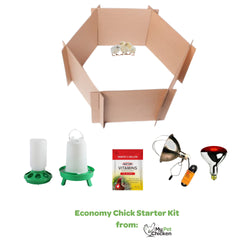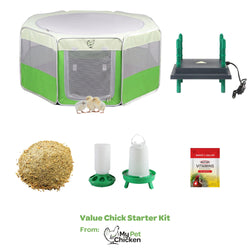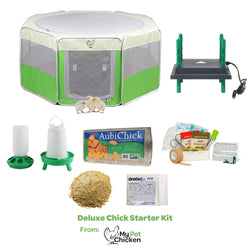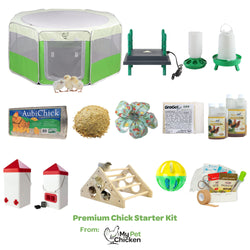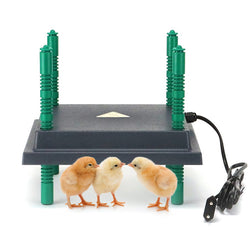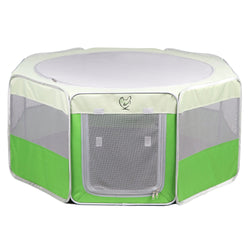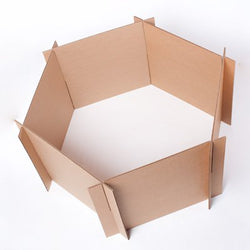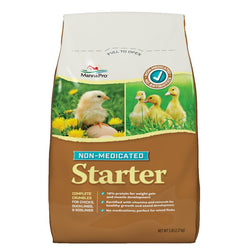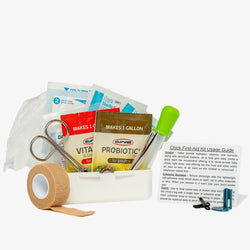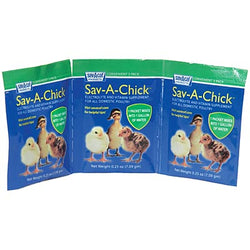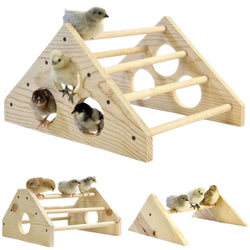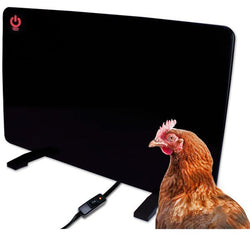What do I need to know about snakes if I keep chickens?
Back to blog
Name:
Snakes
Serpentes spp (nearly 3000 species)
Description:
*Legless reptiles of many colors
*Snakes range in size from just a few inches/a few ounces to those that are more than 25 feet long and more than 200 pounds

Distribution/Habitat:
Various species are found throughout the world
Hunting Behavior:
Most snakes too small to be predators of adult chickens. Instead, they tend to be predators of eggs and young chicks. (The largest snakes are inhabitants of rain forests, and we suspect that very few backyard chicken keepers will live in the Indian or South American jungles.) Very small snakes won't even be a danger to your eggs, but may primarily eat insects, worms, tadpoles, minnows, salamanders, slugs, or tiny frogs. By contrast, your chickens will likely hunt and eat small racers and garters, and may even regard them as a special treat. My chickens catch tiny snakes and then flee the flock with the little snake danging from a beak, occasionally having the special prize stolen by another hen, and generally playing "keep away" until someone has enough time to gobble it down.
If snakes are large enough to be stealing your eggs, however, you may see no signs other than the missing eggs. Even larger snakes can squeeze through very small openings, and are difficult to exclude from the coop. After having eaten an egg, though, they may be temporarily too large to escape from the same opening they entered, if it was a tight fit! If they have grown accustomed to stealing eggs from you, they may even eat any wooden eggs or golf balls you place in the nest to show your chickens where to lay.
Most snakes will not be a danger to your adult birds, but predation by snakes does happen. If there are any remains in the coop, you might find a chicken with a wet head, indicating that the snake tried to swallow her and then gave up because she was too large. Since they ingest their prey whole, snakes that do manage to swallow an entire chicken would not be able to get out of the coop again unless there is already a chicken-sized opening in the coop. If the snakes can escape your coop after having dined on chicken, you will probably see no sign, so it may be difficult to tell whether your loss was due to a snake or to theft by humans.
Protecting Your Flock
The smallest snakes are probably more in danger FROM your chickens than a danger TO your chickens. Snakes that are large enough to be a danger to your eggs may first be attracted to your area because they are eating mice or rodents, so be sure to take care of any rodent problems to avoid attracting snakes to your yard in the first place. Further, be sure to find any hidden eggs your hens may lay in your yard and to encourage your flock to lay inside their coop, where you will be sure to find their eggs. Gather your eggs regularly so meals won't be available.
If you are very concerned about snakes, you may want to add a fine mesh hardware cloth over any ventilation holes or other openings into your coop. Snakes can slip right through chicken wire, although they may have a hard time escaping again after they have eaten an egg! Since other predators can tear through chicken wire so easily, too, chicken wire is just a bad idea for coop security in almost any situation. Remember, chicken wire should only be used to keep chickens in, not to keep predators out. Instead, for predator protection, use sturdy hardware cloth with a mesh small enough to exclude your local snakes (1/2" or 1/4").

Snakes
Serpentes spp (nearly 3000 species)
Description:
*Legless reptiles of many colors
*Snakes range in size from just a few inches/a few ounces to those that are more than 25 feet long and more than 200 pounds

Distribution/Habitat:
Various species are found throughout the world
Hunting Behavior:
Most snakes too small to be predators of adult chickens. Instead, they tend to be predators of eggs and young chicks. (The largest snakes are inhabitants of rain forests, and we suspect that very few backyard chicken keepers will live in the Indian or South American jungles.) Very small snakes won't even be a danger to your eggs, but may primarily eat insects, worms, tadpoles, minnows, salamanders, slugs, or tiny frogs. By contrast, your chickens will likely hunt and eat small racers and garters, and may even regard them as a special treat. My chickens catch tiny snakes and then flee the flock with the little snake danging from a beak, occasionally having the special prize stolen by another hen, and generally playing "keep away" until someone has enough time to gobble it down.
If snakes are large enough to be stealing your eggs, however, you may see no signs other than the missing eggs. Even larger snakes can squeeze through very small openings, and are difficult to exclude from the coop. After having eaten an egg, though, they may be temporarily too large to escape from the same opening they entered, if it was a tight fit! If they have grown accustomed to stealing eggs from you, they may even eat any wooden eggs or golf balls you place in the nest to show your chickens where to lay.
Most snakes will not be a danger to your adult birds, but predation by snakes does happen. If there are any remains in the coop, you might find a chicken with a wet head, indicating that the snake tried to swallow her and then gave up because she was too large. Since they ingest their prey whole, snakes that do manage to swallow an entire chicken would not be able to get out of the coop again unless there is already a chicken-sized opening in the coop. If the snakes can escape your coop after having dined on chicken, you will probably see no sign, so it may be difficult to tell whether your loss was due to a snake or to theft by humans.
Protecting Your Flock
The smallest snakes are probably more in danger FROM your chickens than a danger TO your chickens. Snakes that are large enough to be a danger to your eggs may first be attracted to your area because they are eating mice or rodents, so be sure to take care of any rodent problems to avoid attracting snakes to your yard in the first place. Further, be sure to find any hidden eggs your hens may lay in your yard and to encourage your flock to lay inside their coop, where you will be sure to find their eggs. Gather your eggs regularly so meals won't be available.
If you are very concerned about snakes, you may want to add a fine mesh hardware cloth over any ventilation holes or other openings into your coop. Snakes can slip right through chicken wire, although they may have a hard time escaping again after they have eaten an egg! Since other predators can tear through chicken wire so easily, too, chicken wire is just a bad idea for coop security in almost any situation. Remember, chicken wire should only be used to keep chickens in, not to keep predators out. Instead, for predator protection, use sturdy hardware cloth with a mesh small enough to exclude your local snakes (1/2" or 1/4").

